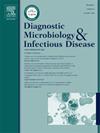Strengthening molecular testing capacity in Colombia: Challenges and opportunities
IF 2.1
4区 医学
Q3 INFECTIOUS DISEASES
Diagnostic microbiology and infectious disease
Pub Date : 2025-01-28
DOI:10.1016/j.diagmicrobio.2025.116716
引用次数: 0
Abstract
The COVID-19 pandemic has accelerated efforts to enhance pathogen detection using molecular biology techniques. This study examines the expansion of molecular testing capacity in Colombia, identifying strengths and areas for improvement in the existing infrastructure. The study began with the creation of a database inventorying laboratories based on publicly available data from government entities and active web searches. Ten laboratories were selected for detailed characterization. Structured surveys assessed their testing capacity and progress in implementing molecular-based diagnostic tests for various infectious diseases. The strategy for identifying laboratories showed a total of 311 laboratories. Of these, 65 % (n = 202) are private and 21 % (n = 65) are state-owned, mainly public health laboratories, and the remaining 14 % (n = 44) are affiliated with academic institutions. The highest concentration of these labs is in Bogotá, Antioquia, and Valle del Cauca, primarily in urban areas. Key limitations affecting testing laboratories in Colombia include: i) infrastructure (26.2 %), highlighting the need for standardized facility guidelines; ii) quality and documentation (16.7 %), requiring stronger quality management systems; iii) biosafety (14.3 %), emphasizing the need for continuous waste management, especially in public labs; and iv) human talent (10.7 %), needing better policies for staff retention, particularly in government institutions. Strengthening laboratories can establish a comprehensive national molecular testing system. Integrating molecular tests into health system diagnostic algorithms and implementing sustainable laboratory strategies will address human health challenges and support the “One Health” approach for animal and environmental health.

求助全文
约1分钟内获得全文
求助全文
来源期刊
CiteScore
5.30
自引率
3.40%
发文量
149
审稿时长
56 days
期刊介绍:
Diagnostic Microbiology and Infectious Disease keeps you informed of the latest developments in clinical microbiology and the diagnosis and treatment of infectious diseases. Packed with rigorously peer-reviewed articles and studies in bacteriology, immunology, immunoserology, infectious diseases, mycology, parasitology, and virology, the journal examines new procedures, unusual cases, controversial issues, and important new literature. Diagnostic Microbiology and Infectious Disease distinguished independent editorial board, consisting of experts from many medical specialties, ensures you extensive and authoritative coverage.

 求助内容:
求助内容: 应助结果提醒方式:
应助结果提醒方式:


